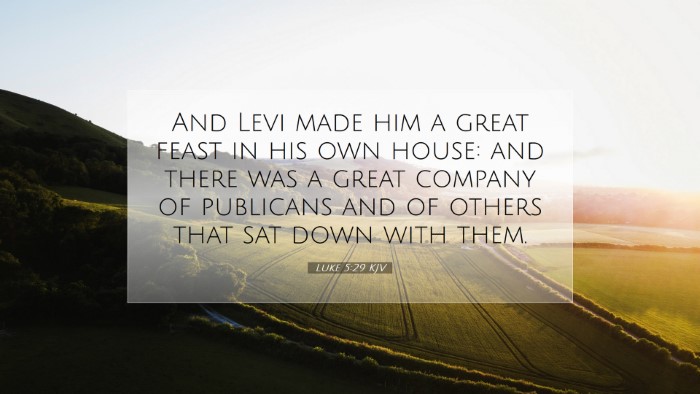Bible Commentary on Luke 5:29
Luke 5:29 states: "And Levi made him a great feast in his own house: and there was a great company of publicans and of others that sat down with them."
Contextual Overview
This verse occurs at a pivotal moment in Jesus’ ministry. Levi (Matthew), a tax collector, is called by Jesus to follow Him. Immediately after this call, Levi hosts a great feast in his house, inviting many others from his profession. This act serves as a reflection of the transformative power of Jesus’ call and the social dynamics of the time.
The Significance of Levi's Feast
The feast Levi organized is significant for several reasons:
-
Inclusion of Sinners: Highlights Jesus’ mission to reach the marginalized and those considered outcasts by Jewish society.
-
Symbol of Transformation: Represents the immediate change in Levi's life and priorities after his encounter with Jesus.
-
Evangelistic Witness: Provides an opportunity for others to encounter Jesus through Levi's hospitality.
Commentary Insights
Matthew Henry's Commentary
Matthew Henry emphasizes Levi's immediate response to Jesus' call. He notes that Levi did not hesitate or debate, but rather responded joyfully. By making a great feast, Levi expressed his gratitude and desire to share this transformative moment with others. Henry points out that the gathering was not merely a social event; it was spiritual outreach:
-
Levi's Zeal: Levi's actions symbolize a zeal for evangelism, showcasing the impact of knowing Christ firsthand.
-
Importance of Community: The company of publicans (tax collectors) represents that the gospel is for all, including those marginalized by religion.
Albert Barnes' Notes on the Bible
Barnes provides a detailed analysis of the customs surrounding meals in the ancient near east. He explains that sharing a meal was a significant act of fellowship and acceptance. By hosting sinners, including fellow publicans, Levi was making a bold statement:
-
Social Implications: The gathering implies that Levi identified strongly with his peers in a society that despised them.
-
Jesus’ Acceptance: Barnes stresses that Jesus’ presence indicates His rejection of the religious elitism that separates people from God’s grace.
Adam Clarke's Commentary
Clarke’s insights bring attention to the extraordinary nature of Jesus’ association with the publicans. He notes the cultural stigma attached to tax collectors as collaborators with the oppressive Roman government:
-
Divine Mercy: Clarke emphasizes that this moment exemplifies the principle of divine mercy that characterizes Jesus’ ministry.
-
Reversal of Expectations: Jesus’ actions subvert the expectations of the religious leaders, illustrating that His kingdom is for all who would repent.
Theological Implications
The theological implications of this narrative are multifaceted:
-
Grace Over Law: Levi’s acceptance by Jesus demonstrates that grace prevails over legalistic interpretations of righteousness.
-
Radical Inclusivity: Jesus' approach highlights a radical inclusivity, inviting all irrespective of social standing or past sins.
-
Empowerment for Mission: Levi’s transformation points to the empowerment believers receive to witness and advocate for the marginalized.
Application for Today’s Believers
For pastors, students, theologians, and believers today, this passage encourages an introspective examination of how we engage with our communities:
-
Embrace Those on the Margins: We are called to reflect Jesus’ compassion by embracing outcasts in our communities.
-
Share Our Transformation: Like Levi, we are called to share the joy of our transformation with others, fostering an environment of openness to the gospel.
-
Reevaluate Social Barriers: This passage challenges us to reevaluate social barriers that inhibit the sharing of the gospel.
Conclusion
Luke 5:29 is more than a historical account; it serves as a blueprint for how followers of Christ are to relate to one another and to those outside the church. It underscores the radical nature of Jesus' call, the importance of community, and the eternal purpose of inclusivity in the kingdom of God.


